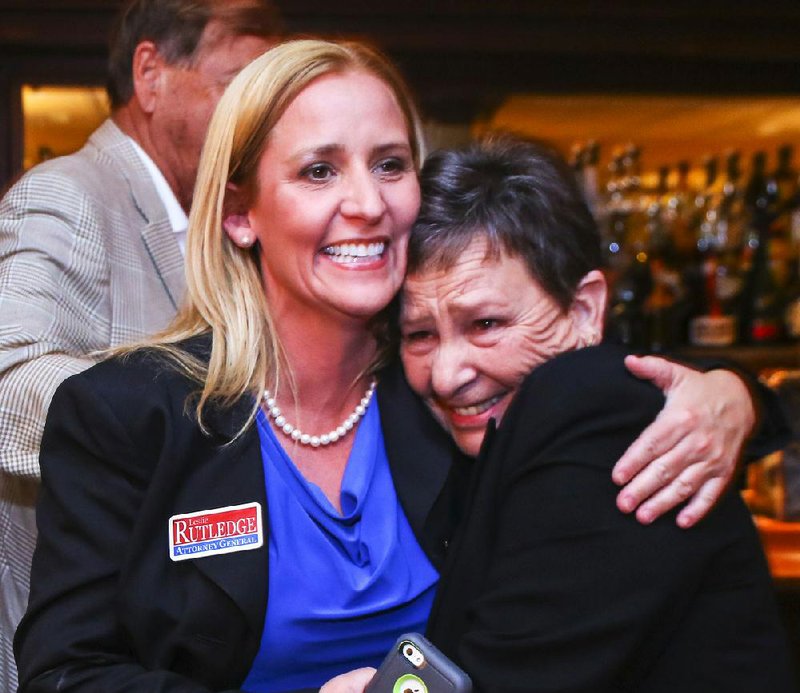Leslie Rutledge handily defeated David Sterling for the Republican attorney general nomination in the primary runoff election Tuesday.
With 2,037 of 2,456 precincts reporting, Rutledge received 43,082 votes, and Sterling had 29,908 votes.
The two Little Rock lawyers failed to get a majority of the vote in the three-way May 20 primary that included Jacksonville lawyer Patricia Nation, leading to Tuesday's runoff.
Last month, Rutledge received 47.21 percent of the vote with 79,347 votes, Sterling finished with 39.11 percent, or 65,733 votes, and Nation had 13.68 percent, or 22,986 votes.
Rutledge will now face state Rep. Nate Steel, D-Nashville, and Springdale Libertarian Aaron Cash in the Nov. 4 general election.
Democratic Attorney General Dustin McDaniel of Little Rock is barred from seeking re-election under the state's term limits amendment.
The attorney general is the chief law enforcement officer in the state and is in charge of all criminal appeals on behalf of the state. The annual salary is $72,408 but will increase to $73,132 in the fiscal year starting July 1.
Since the primary, the candidates clashed repeatedly, and an estimated $1 million was spent on advertising, phone calls and mailers by the Washington, D.C.-based Judicial Crisis Network. The group targeted Rutledge and her position on stand-your-ground laws.
Rutledge and Sterling raised a combined $84,000 in the 10 days after the May 20 primary, and Rutledge picked up Nation's endorsement.
Rutledge, 38, a former Republican National Committee counsel and gubernatorial adviser, said in an interview that she was overwhelmed by the support she received in the election. She said Sterling called to congratulate her and that she looked forward to starting her general-election campaign today.
"We're going to run the same campaign. We look forward to working with all Arkansans and we believe the same message is the right message," Rutledge said.
Rutledge said she felt as if the election also showed the "D.C. beltway bandits" that "Arkansas is not for sale," referring to the Judicial Crisis Network ads.
"I think that Arkansans knew that they were being lied to about my credentials and qualifications," Rutledge said.
Sterling, 45, an attorney at Cox, Sterling & McClure PLLC, thanked his wife and supporters and said that "when [God] closes one door he opens another." He said Rutledge "ran a very spirited battle," but that it was too early to say if he would endorse her in the general election.
"We're just trying to process and digest tonight," Sterling said.
Sterling said he felt like his message resonated with voters and that he would continue "moving the state forward."
The attorney general's race has been contentious at times, with both candidates touting their own experience and taking jabs at each other in interviews and press releases.
Last week, Sterling said Rutledge had voted in five Democratic primary elections and contributed seven years ago to the state Democratic Party. Rutledge said she voted in the elections because there were so few Republicans on the ballot until recently, and that the contribution was for a ticket to Gov. Mike Beebe's inaugural ball.
Rutledge said she never knowingly gave to the Democratic Party of Arkansas.
Rutledge responded with a press release accusing Sterling of accepting a $2,000 contribution from a payday-lending company called Ace Cash Express. Sterling has said the group does not do payday lending in Arkansas but instead offers other services.
Rutledge also claimed in interviews that Sterling "took money from the pornography industry" for his representation of Cupid's Lingerie in a business dispute. Sterling declined to discuss the case at length, citing attorney-client privilege, but he said it involved whether former employees' contracts with the company would prohibit them from opening a competing business.
Rutledge has also criticized the Judicial Crisis Network's advertising, calling the group's claims "outlandish lies" and arguing that people can already protect themselves with deadly force when they're threatened. Rutledge has said she would help the Legislature pass such a law in the state, but has not advocated for one.
Sterling has said he supports passage of a stand-your-ground law, which generally allow a person, who is lawfully in a place and is confronted by an attacker, to use deadly force against the assailant rather than requiring that they first attempt to flee.
Twenty-two states have some form of law that says there is no obligation to retreat from an attacker, and nine of them specifically say the person may "stand his or her ground," according to the National Conference of State Legislatures.
The Judicial Crisis Network has declined interview requests, but it said in a statement that it takes lawyers with the right philosophy and experience to "protect and defend the public from Obama's activist agenda."
Throughout the campaign, Rutledge said Sterling was wrong to endorse the use of the electric chair, calling his promotion of the device "irresponsible rhetoric." Sterling has said the electric chair is already an alternative to lethal injection under state law.
No execution has been carried out in the state since 2005, largely because of lawsuits challenging the constitutionality of the Method of Execution Act. The most recent version of the law was struck down by a Pulaski County judge in February.
Arkansas Code Annotated 5-4-617 states that the Arkansas Department of Correction "shall carry out the sentence of death by electrocution" if the state's Method of Execution Act is "invalidated by a final and unappealable court order."
Sterling has also promoted the use of pentobarbital, an anesthetic used in other states, as an alternative, while Rutledge has said she would work with the U.S. Food and Drug Administration to get access to necessary drugs.
A section on 06/11/2014

